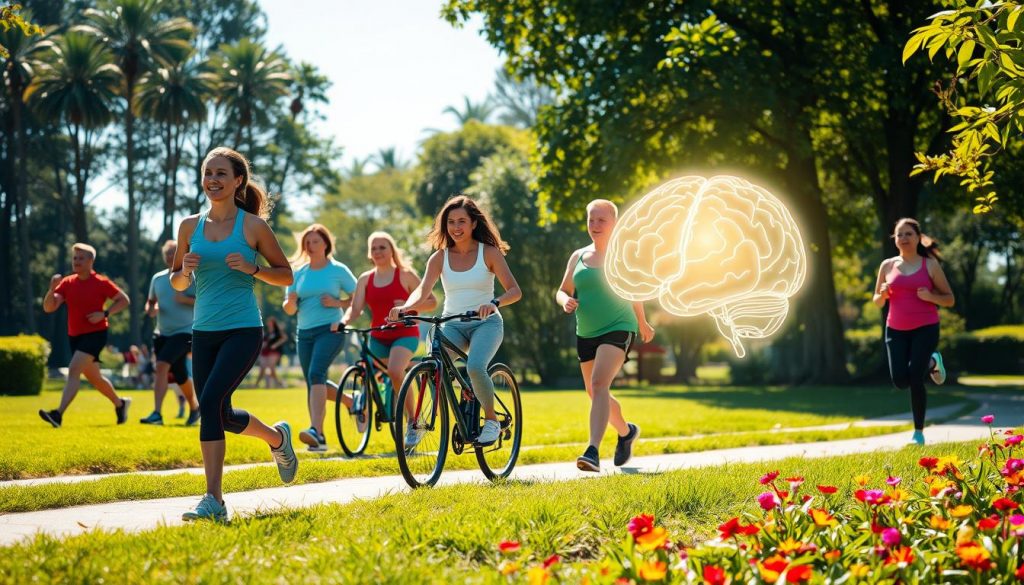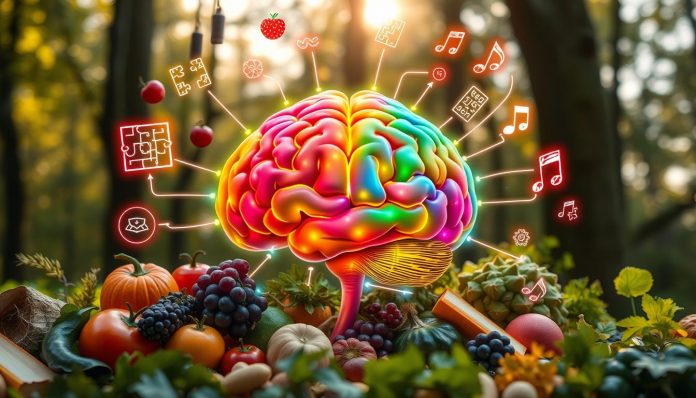Every day, you challenge your brain and try to improve your memory. Cognitive Health is key to feeling your best. You can boost it with lifestyle changes and natural supplements. Simple tips can make a big difference in your mental sharpness.
Keeping your brain sharp is more important than ever. It helps you face daily tasks and stay active. We’ll share the latest on cognitive health. You’ll get tips to improve your brain function and overall health.
Table of Contents
Key Takeaways
- Prioritize cognitive health to maintain a sharp mind and overall well-being
- Incorporate lifestyle changes to enhance brain function and memory improvement
- Utilize natural supplements to support cognitive health
- Engage in regular social interaction to prevent cognitive decline
- Aim for at least 150 minutes of moderate physical activity per week to benefit cognitive health
- Manage chronic stress to reduce the risk of dementia and Alzheimer’s disease
- Focus on whole foods, such as fruits, vegetables, and lean proteins, to combat oxidative stress
Understanding Cognitive Health
Cognitive health is key to your overall well-being. It’s closely tied to your mental wellness. Your brain works hard every day, and it needs to do so well for your mental health.
Preventing cognitive decline is vital for your mental wellness. Studies show that eating well, like the Mediterranean diet, helps a lot. Regular exercise, socializing, and enough sleep also play big roles.
By adding these habits to your life, you can lower the risk of cognitive decline. This helps keep your mental wellness strong. Remember, cognitive health is not just about avoiding disease. It’s also about keeping your brain working at its best.
Definition of Cognitive Health
Cognitive health is about how well your brain handles information, learns, and adapts. It includes things like memory, attention, and solving problems. As you get older, your brain might not work as well, but there are ways to slow this down.
Importance of Cognitive Health
Good cognitive health is vital for a great life. It lets you stay independent, make smart choices, and enjoy being with others. Taking care of your brain helps prevent dementia, depression, and anxiety. A healthy brain is essential for feeling good overall.
- Regular exercise, such as High-Intensity Interval Training (HIIT)
- A balanced diet, including foods rich in omega-3 fatty acids and antioxidants
- Adequate sleep, aiming for 7-9 hours per night
- Social interaction, such as engaging in hobbies or spending time with friends and family
- Cognitive stimulation, such as reading, puzzles, or learning a new skill
By making these habits part of your life, you can boost your cognitive health. This helps prevent decline and keeps your mental wellness at its best.
Signs of Declining Cognitive Function
As you age, keeping an eye on your brain health is key. Declining cognitive function shows up in many ways. It’s important to know the signs and get help when needed.
Studies show that activities like horticulture boost brain health. For example, a study in Singapore found that people visiting therapeutic gardens felt better mentally than those in regular gardens. This shows how important it is to add brain-healthy activities to your day.
Common signs of cognitive decline include memory loss and trouble focusing. If you or someone you know is showing these signs, getting help from a doctor is a must. They can guide you on how to support your brain health and cognitive function.
Common Symptoms to Watch For
- Memory loss or trouble learning new things
- Struggling to concentrate or make decisions
- Feeling less mentally flexible or slower
When to Seek Help
If you notice these symptoms, don’t wait to get help. A doctor can diagnose and suggest treatments to help your brain health. By acting early, you can keep your cognitive function sharp and your brain healthy.
Nutrition and Its Impact on Cognition
When thinking about brain health, nutrition is key. A balanced diet is vital for keeping your brain sharp. Studies show that some foods and supplements can boost brain health.
Eating healthy, like the Mediterranean or DASH diet, can slow down brain decline. These diets fight oxidative stress and inflammation. They’re full of omega-3 fatty acids, which are good for the brain. Also, drinking enough water is important for your brain, as dehydration can hurt your thinking skills.
Brain-Boosting Foods
Some foods are great for your brain. These include:
- Fatty fish, which are rich in omega-3 fatty acids
- Nuts and seeds, which are high in healthy fats and antioxidants
- Leafy green vegetables, which are rich in vitamins and minerals
Supplements for Cognitive Health
Some supplements, like bacopa, can help your brain. Bacopa may improve memory and thinking in people with brain issues. But, always talk to a doctor before taking any supplements.
The Role of Physical Exercise
Regular physical exercise is key for keeping your cognitive health in top shape. It boosts blood flow to the brain and helps grow new neurons. This can also lower the chance of losing brain function as we age. A study on physical exercise and brain health shows that running strengthens bones, fighting off osteoporosis.
Some top exercises for your brain are:
- Running, which makes your brain work better by increasing serotonin
- Swimming, which is good for your heart and eases stress
- Cycling, which lifts your mood and sharpens your mind
Exercise also changes your mood and brain function by releasing special hormones. These hormones, like endorphins and endocannabinoids, bring physical and mental benefits. With 96% of runners feeling better emotionally, it’s clear that exercise is vital for cognitive health and happiness.

Mental Exercises for Cognitive Improvement
Doing mental exercises is key to better brain function and memory. Puzzles, brain games, and learning new things can boost your brain. For example, optical illusions make you find hidden objects, sharpening your focus and problem-solving.
Here are some ways to improve your brain and memory:
- Solving optical illusions, which can give you a dopamine rush and make you feel accomplished
- Working on visual puzzles, which sharpen your focus and problem-solving skills
- Learning new skills, like a language or a musical instrument, which challenge your brain and improve thinking
Adding mental exercises to your daily routine can greatly benefit your brain. Regular mental workouts can lead to better thinking and memory. This makes your brain healthier and more active.
It’s important to make mental exercises fun and challenging. Choose activities you enjoy that also challenge your brain. This way, mental exercises become a fun part of your daily life. By focusing on mental exercises, you can actively improve your brain function and memory.
| Mental Exercise | Benefits |
|---|---|
| Solving Optical Illusions | Improves attention to detail and problem-solving abilities |
| Engaging with Visual Puzzles | Enhances cognitive skills and memory |
| Learning New Skills | Challenges the brain and improves cognitive function |
Social Interaction and Cognitive Health
Understanding the link between social interaction and mental wellness is key. It’s vital for preventing cognitive decline. Staying active socially can help keep your mind sharp.
Studies show that socializing is good for older adults’ brains. Staying connected with friends and family builds cognitive reserve. It also lowers stress and anxiety, which harm brain health.
Quality matters more than quantity in social interactions. A few deep, meaningful relationships are better than many shallow ones. This approach boosts mental wellness and fights cognitive decline.
Here are some ways to stay socially active and support your brain health:
- Join a club or organization that aligns with your interests
- Volunteer in your community
- Take part in group fitness classes or sports
Adding social interaction to your daily routine can improve mental wellness. It also helps prevent cognitive decline. This supports overall mental health.
Sleep and Cognitive Performance
Sleep is key for brain health and cognitive function. It helps the brain process and store memories. Not getting enough sleep can hurt how well we think and make decisions.
A study showed that people who slept 7-9 hours a night did better on brain tasks. Eating a Mediterranean diet also helps keep the brain healthy and can prevent memory loss. For more on natural ways to control hunger and manage weight, check out this website.
Here are some tips for better sleep:
- Stick to a regular sleep schedule
- Make your sleep area calm and comfy
- Stay away from caffeine and screens before bed
By focusing on sleep and living healthily, you can boost your brain health and cognitive function. This leads to better overall health and happiness.
| Sleep Duration | Cognitive Performance |
|---|---|
| 7-9 hours | Improved attention and memory |
| Less than 7 hours | Impaired attention and memory |
Stress Management Techniques
Life can be demanding, so it’s key to focus on brain health and cognitive skills. Using stress management techniques is vital for a healthy brain and better well-being. Mindfulness and meditation can help reduce stress and anxiety, boosting your brain function.
Studies show that relaxing activities, like horticultural therapy, are good for mental health. For instance, a study in Singapore found that people visiting therapeutic gardens felt better mentally than those in regular gardens. It’s important to take breaks and do things that relax and support the brain.

To sharpen your cognitive skills, try breathing exercises daily. They help increase oxygen to the brain, improving function. Here are some stress management tips:
- Mindfulness meditation: Focus on the now to lower stress and anxiety.
- Deep breathing exercises: Boost oxygen to the brain for better thinking.
- Physical activity: Regular exercise cuts stress and boosts overall health.
By adding these stress management methods to your daily life, you can enhance brain support and cognitive skills. This leads to a healthier, more balanced life.
| Stress Management Technique | Benefits |
|---|---|
| Mindfulness meditation | Reduces stress and anxiety, improves cognitive function |
| Deep breathing exercises | Increases oxygen flow to the brain, improves cognitive function |
| Physical activity | Reduces stress, improves overall well-being |
Technology and Cognitive Health
As you explore the digital world, think about how technology affects your brain health. Using technology wisely can help keep your brain sharp. There are many apps and tools that can boost your brain power.
Apps for brain training can improve your memory, focus, and problem-solving skills. These apps help you build strong brain abilities. It’s also important to balance screen time with mental health. Too much screen time can harm your brain, but a little can help.
Here are some tips for balancing screen time with mental health:
- Set limits on your screen time
- Engage in physical activity
- Practice mindfulness and meditation
By following these tips, you can improve your brain health. Remember, technology is a great tool for brain health, but use it wisely.
As you work to improve your brain health, think about technology’s role. Using technology smartly and keeping a balance can help your brain and overall health.
| App | Focus | Benefits |
|---|---|---|
| Brain Training App | Memory, Attention | Improved cognitive function, enhanced focus |
| Mindfulness App | Mindfulness, Meditation | Reduced stress, improved mental health |
Creating a Supportive Environment
Your surroundings greatly affect your cognitive function. Organizing your space and encouraging good habits at home can improve your brain health and memory. This is key for better brain function.
Begin by tidying up and making your workspace better. Remove distractions, get the right lighting, and keep things calm and organized. This helps you focus and remember things better. Adding plants, natural light, and soft music can also help your mental health.
Also, start positive habits at home for your brain. Do regular exercise, use stress-reducing methods, and get enough sleep. Having a supportive environment can greatly improve your brain function and memory.
FAQ
What is cognitive health and why is it important?
What are the common signs of declining cognitive function?
How can nutrition impact cognitive health?
What are the benefits of physical exercise for cognitive health?
How can mental exercises improve cognitive abilities?
How does social interaction impact cognitive health?
What role does sleep play in cognitive performance?
How can stress management techniques benefit cognitive health?
How can technology both help and hinder cognitive health?
What environmental factors can influence cognitive health?
Source Links
- Campus Joins Together to Provide Support for LA Fires – https://www.ucdavis.edu/news/campus-joins-together-provide-support-la-fires
- Optical illusion: You have hit the jackpot if you can spot the hidden cane in 11 seconds | – Times of India – https://timesofindia.indiatimes.com/life-style/health-fitness/de-stress/optical-illusion-you-have-hit-the-jackpot-if-you-can-spot-the-hidden-cane-in-11-seconds/articleshow/117078011.cms
- 7 Factors That Can Affect Cognitive Decline—And What You Can Do About Them – https://www.yahoo.com/lifestyle/7-factors-affect-cognitive-decline-201634685.html
- HIIT the Clouds Away: Penni Jones on Her Journey with Fitness and Mental Health – The Sun Times News – https://thesuntimesnews.com/hiit-the-clouds-away-penni-jones-on-her-journey-with-fitness-and-mental-health/
- Singapore has a unique idea for tourism: Focus on your mental health – https://www.nationalgeographic.com/travel/article/singapore-wellness-mental-health
- This Indian herb has been shown to improve memory and brain health – https://nypost.com/2025/01/09/health/ancient-herb-taking-brain-health-to-the-next-level-revealed/
- 7 Factors That Can Affect Cognitive Decline—And What You Can Do About Them – https://www.aol.com/7-factors-affect-cognitive-decline-201634054.html
- 6-6-6 Walking Trend for Weight Loss: Does It Work? – https://www.healthline.com/health-news/666-walking-trend-weight-loss
- Exploring Runner’s High: How the Body and Brain Respond to Running? – https://www.onlymyhealth.com/what-is-runners-high-how-body-and-brain-respond-to-running-12977823290
- =// Liv Pure Reviews: [2025] Is This Weight Loss Supplement Worth Your Time and Money? – Tribune-Review – https://community.triblive.com/article/preview/a90e1ad8-0296-477e-9f96-46835de161b9?ert=
- Neuro-Thrive Reviews — [Updated 2025] My Honest Feedback, Pros, Cons, Ingredients – Tribune-Review – https://community.triblive.com/article/preview/c03a0a0b-568f-43c3-9890-79c0dba46731
- Heterosexual and homosexual individuals value altruism equally in potential mates – https://www.psypost.org/heterosexual-and-homosexual-individuals-value-altruism-equally-in-potential-mates/
- Why We Don’t Like Being Called “Strong” After Adversity – https://www.psychologytoday.com/intl/blog/defining-memories/202412/why-we-dont-like-being-called-strong-after-adversity
- Deep sleep clears toxic waste from the brain – https://www.earth.com/news/deep-sleep-clears-toxic-waste-from-the-brain/
- 7 Factors That Can Affect Cognitive Decline—And What You Can Do About Them – https://www.eatingwell.com/factors-that-help-reduce-cognitive-decline-risk-8772060
- Are You in Denial? – https://www.psychologytoday.com/intl/blog/less-stress-more-peace/202501/are-you-in-denial
- The importance of preventative care for a healthy workforce – HR Magazine – https://www.hrmagazine.co.uk/content/insights/the-importance-of-preventative-care-for-a-healthy-workforce
- The rise of sauna culture in Canada | CBC Life – https://www.cbc.ca/life/wellness/rise-of-sauna-culture-canada-1.7427402
- Find Reliable Alcohol Rehab in Atlanta to Begin Your Journey: Expert Guide to Local Treatment Options – GIS user technology news – https://gisuser.com/2025/01/find-reliable-alcohol-rehab-in-atlanta-to-begin-your-journey-expert-guide-to-local-treatment-options/












